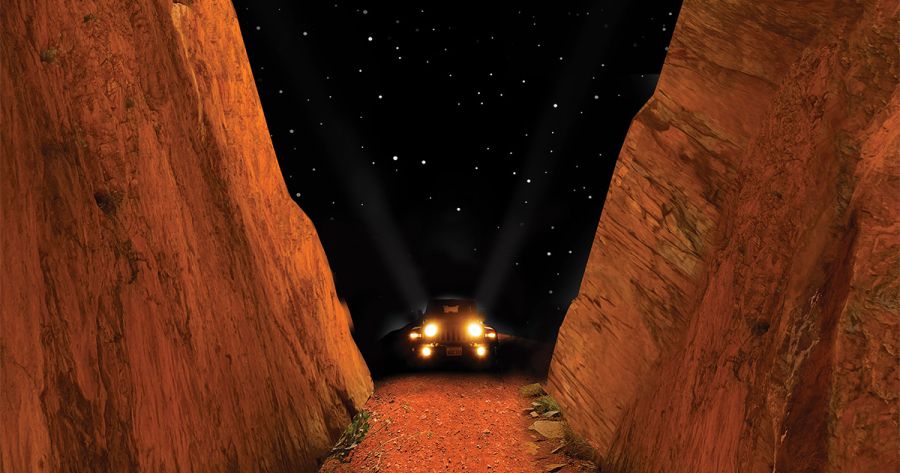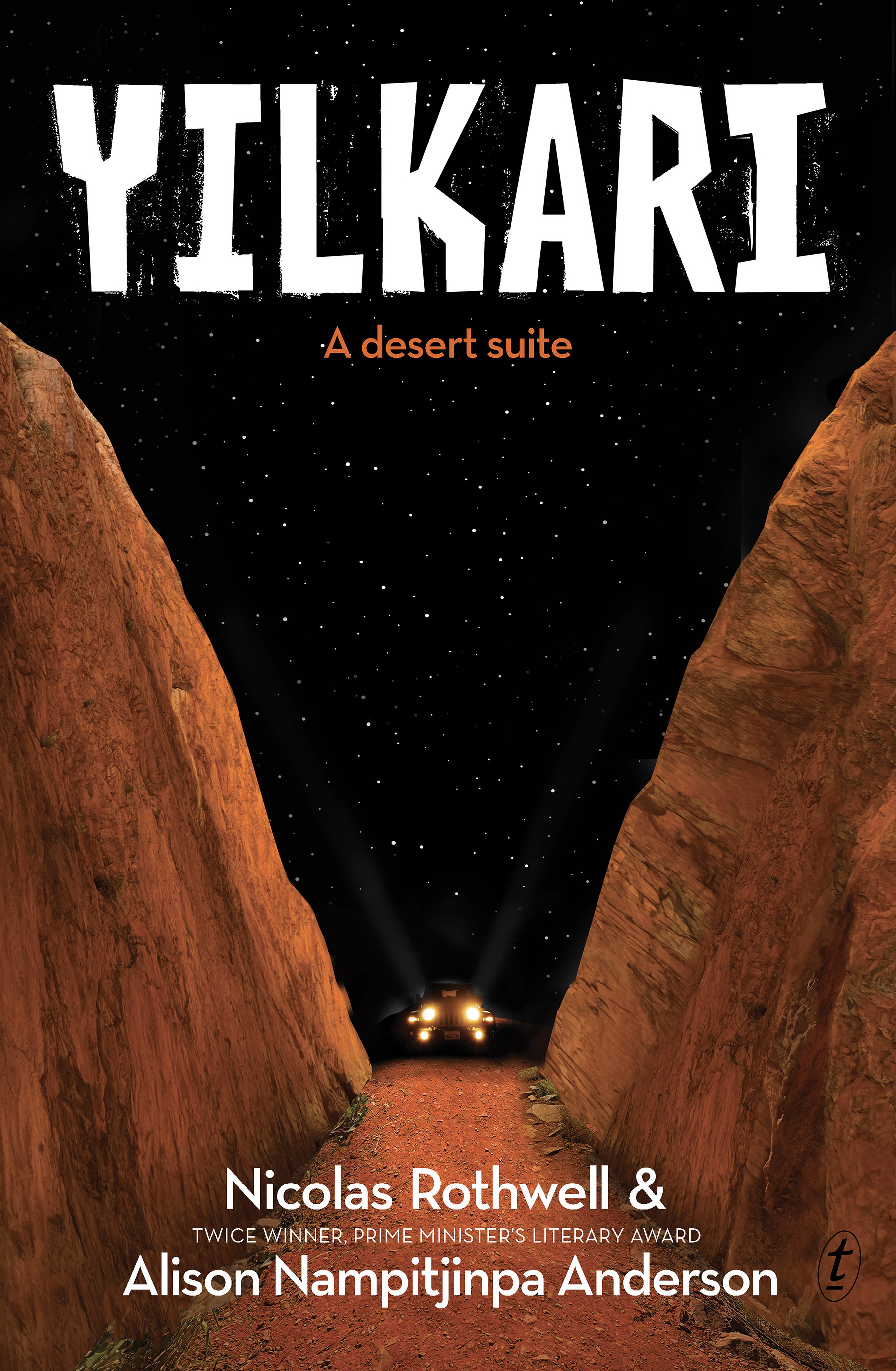
- Free Article: No
- Contents Category: Fiction
- Review Article: Yes
- Article Title: Words in us
- Article Subtitle: Novel by symbiosis
- Online Only: No
- Custom Highlight Text:
Outsiders, mostly white men seeking answers to burning existential questions, have long been ineluctably drawn to Australian deserts. The continental interior, with its deep-time mysteries, has lured not only explorers on fatal quests, but also lone anthropologists, philosophers, and other restless wanderers in search of themselves, burdened with their interrogations and yearnings for higher truth.
- Book 1 Title: Yilkari
- Book 1 Subtitle: A desert suite
- Book 1 Biblio: Text Publishing, $34.99 pb, 288 pp
- Book 1 Cover Small (400 x 600):

- Book 1 Cover (800 x 1200):

- Book 1 Readings Link: https://www.readings.com.au/product/9781923058422/yilkari--nicolas-rothwell--2025--9781923058422#rac:jokjjzr6ly9m
New journeys, mostly taken on red dust roads carved out long ago by Commonwealth Surveyor Len Beadall, provide the narrative path of Yilkari: A desert suite by journalist and novelist Nicolas Rothwell and his wife, Alison Nampitjimpa Anderson, a Luritja-Pintupi artist and writer from Papunya in the Western Desert. Prefacing the journey that twists through their beautiful, mesmerising, and form-defying novel, they write:
This book, the product of two minds, has been long in the making and long in our thoughts ... The country writes its words in us, and through time we, too, became each other’s authors.
It is little wonder that Yilkari exudes the aura of a life’s – or lives’ – work. For in every sense the truth at the heart of this unique novel is that neither author could have written it alone. Only in symbiosis could Yilkari be created.
Rothwell, a true cosmopolitan of Australian and Czech parentage who wandered the world as a journalist in the 1980s and 1990s, is rightly celebrated as a writer (novels, non-fiction books, and journalism) of elegance and observational acuity. He is intimately familiar with the desert – its roads, towns, settlements, and colonial history – where he has lived in later life. But it is Anderson who has the unique relationship with the country in this novel because she is of it, geographically, cosmologically.
This novel’s essence is about who gets to know – who is capable of truly knowing – the interior and its animated landscapes, sacred sites, ominous spirits, and creation stories. Its narrative is rollicking and meditative, painfully poignant and occasionally very funny, as its four main characters – Valentin, Dylan, Captain, and Master – individually careen along corrugated roads with the narrator, ‘I’. First comes Valentin, a Siberian composer, who the narrator (later referenced as ‘Tjilpi’ – someone of seniority – by Aboriginal man Dylan) met as the Berlin Wall fell in 1989.
Valentin has lost his music. He has come from Europe to a desert roadhouse in Australia to find the narrator, who told him that Berlin evening about the desert’s mysteries. Valentin ‘wants to change his life’. Together they travel to find Mr Giles, a maparnjarra – a type of shaman. By the campfire, Mr Giles touches Valentin’s chest. He sings and taps clapsticks. Valentin claps along, to the narrator’s horror, who thinks this taboo. Mr Giles seems unfazed. He moves closer to Valentin.
It is one of the many moments in Yilkari that underscore the unknowability of Indigenous belief systems for outsiders. For no matter how long they might have spent on Country, and regardless of how conversant they may feel with a First Nations culture, truth remains as complex as the landscape, as confounding as the ‘everywhen’ of First Nations understandings of time.
‘Yilkari’, readers learn via a non-Indigenous explanation, means ‘sky; Heaven; clarity; everlastingness and distance’ and probably ‘other higher things as well’. The Indigenous definition is more succinct: ‘the place maparn [magic healing] comes from’.
Almost forty years ago, Bruce Chatwin published his own form-defying novel The Songlines. Some might find parallels between The Songlines – which drew popular attention to Indigenous cosmology – and Yilkari. But Chatwin, like his autobiographical protagonist Bruce, was a stranger to the country he wrote about, having spent barely two months in the places that filled his masterful novel. Rothwell’s easy, topographic familiarity with the desert, his years spent there among its people, is the golden thread stitched through the prose of Yilkari. Anderson’s wisdom and knowledge is its guiding star.
It is in the melding of the writers’ different capacities for understanding that such an insightful authorial voice, always devoid of the didactic, is crafted. Driving with Dylan, Tjilpi recalls that the first time he saw a range of low hills he thought they resembled reclining animals. Dylan says: ‘You want the country to be like something you know, don’t you, Tjilpi? How hard you try. Just let it be itself, let your imagination rest. You get yourself crossed up with your comparisons.’
Yilkari observes that some outsiders come seeking knowledge, some seek to steal it – some do both. Towards the end, we meet the narrator’s partner, Narulya, an Aboriginal woman with an acute eye and a critical tongue who spells out the cultural crime plainly, observing that there is ‘nothing left from the time of the old artists’.
Narulya says, ‘The curators and the experts take everything and leave nothing for us. They scoop up every secret thing they can. They destroy a culture and call it reconciliation.’
The vast desert of Yilkari is sparsely populated by humans, more heavily by spirits. Existential thoughts necessarily weigh upon those (especially outsiders) who traverse it even if they do not know why. Driving to a special place of many spirits, Tjamu Tjamu, the narrator, and Narulya asks about Valentin. They set up camp. The narrator listens. And suddenly he hears everything.
I found myself blissfully lost in the meandering journeys of Yilkari’s characters and their deeply contemplative conversations. I finished with a renewed sense that cultural appreciation will never be the same as deep knowledge or understanding.


Comments powered by CComment